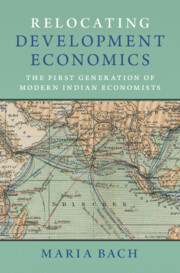Book contents
- Relocating Development Economics
- Historical Perspectives on Modern Economics
- Relocating Development Economics
- Copyright page
- Dedication
- Contents
- Figures
- Tables
- Acknowledgements
- 1 Introduction: Relocating Development Economics
- 1 The Context
- 2 The Beginnings of Indian Economics
- 3 Stages of Civilisation
- 4 Regress
- 5 Developing Balanced Growth at Home
- 6 A Global Win–Win Model for Development
- Epilogue: Multiple Definitions of Progress and Development
- References
- Annex I Archival Sources – Major Works of the First Generation of Modern Indian Economists, 1870–1905
- Index
- Other Books in the Series (continued from page ii)
3 - Stages of Civilisation
Published online by Cambridge University Press: 05 December 2024
- Relocating Development Economics
- Historical Perspectives on Modern Economics
- Relocating Development Economics
- Copyright page
- Dedication
- Contents
- Figures
- Tables
- Acknowledgements
- 1 Introduction: Relocating Development Economics
- 1 The Context
- 2 The Beginnings of Indian Economics
- 3 Stages of Civilisation
- 4 Regress
- 5 Developing Balanced Growth at Home
- 6 A Global Win–Win Model for Development
- Epilogue: Multiple Definitions of Progress and Development
- References
- Annex I Archival Sources – Major Works of the First Generation of Modern Indian Economists, 1870–1905
- Index
- Other Books in the Series (continued from page ii)
Summary
A consensus had formed in the nineteenth century whereby the differences between Europe and the rest of the world could be explained by stadial theory. Different regions were different because they were in different stages of civilisation. Stadial theory conveniently created a narrative that legitimised imperialism by critiquing irrationality and poverty in the rest of the world. Located in a subcontinent over seven thousand kilometres from their foreign rulers, Mahadev Govind Ranade and Romesh Chunder Dutt saw another stadial theory. They tweaked the European version to fit their understanding of India’s history and current reality in the late nineteenth century. Ranade and Dutt remade the theory by including a lower stage to which India had regressed due to imperialism, and an earlier, higher stage of civilisation where India had enjoyed greater progress than it did in the late nineteenth century. Ranade and Dutt, along with their fellow Indian economists, could thus refute the idea that India could not skip to a higher stage of civilisation, because they had already experienced great progress in the past. They did not need to wait to progress and to gain independence, like the stage theorists from Europe argued.
- Type
- Chapter
- Information
- Relocating Development EconomicsThe First Generation of Modern Indian Economists, pp. 59 - 76Publisher: Cambridge University PressPrint publication year: 2024

